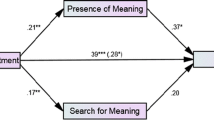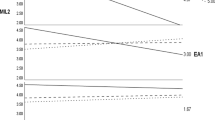Abstract
Research indicates the people who have experienced a decline in their faith tend to have a diminished positive affect. However, it is not clear how the effects of decline in faith arise. The purpose of the current study is to examine the effects of four potentially important mediators: religious practices, compassion, providing support to others, and meaning in life. These mediators were woven into a conceptual model that tests the following hypotheses: (1) people who experience a decline in their faith will be less likely to engage in basic religious practices (i.e., attendance at worship services, reading the Bible, and praying); (2) when religious practices are discontinued people will be less likely to adopt core religious virtues that promote sociality (i.e., compassion); (3) losing the impetus for forming close social relationships makes it less likely that people will help individuals who are in need; (4) people who do not help others will find that it is more difficult developing a strong sense of meaning in life; and (5) people who are unable to find a sense of meaning in life will have a diminished positive affect. Findings from a recent nationwide survey (n = 2798) provide support for each of these hypotheses.

Similar content being viewed by others
References
Barrera, M. (1986). Distinctions between social support concepts, measures, and models. American Journal of Community Psychology, 14, 413–425.
Baumeister, R. F. (1991). Meanings of life. New York: Guilford.
Berger, P. L. (1967). The sacred canopy: Elements of a sociological theory. New York: Doubleday.
Coe, G. A. (1916). The psychology of religion. Chicago: University of Chicago Press.
Cooley, C.H. (1902/2003). Human nature and the social order. New Brunswick, NJ: Transaction Publishers.
Coyne, J. C., Wortman, C. B., & Lehman, D. R. (1988). The other side of support: Emotional overinvolvement and miscarried helping. In B. H. Gottlieb (Ed.), Marshaling social support: Formats, processes, and effects (pp. 305–350). Newbury Park, CA: Sage.
DeShon, R. P. (1998). A cautionary note on measurement error correlations in structural equation models. Psychological Methods, 3, 412–423.
du Toit, M., & du Toit, S. (2001). Interactive LISREL: User’s guide. Lincolnwood, IL: Scientific Software International.
Ellison, C. G., & Lee, J. (2010). Spiritual struggles and psychological distress: is there a dark side of religion? Social Indicators Research, 98, 501–517.
Emmons, R. A. (1999). The psychology of ultimate concerns: Motivation and spirituality in personality. New York: Guilford.
Exline, J. J. (2013). Religious and spiritual struggles. In R. F. Paloutzian & C. L. Park (Eds.), Handbook of the psychology of religion and spirituality (2nd ed., pp. 380–398). New York: Guilford.
Fenelon, A., & Danielsen, S. (2016). Leaving my religion: understanding the relationship between religious disaffiliation, health, and well-being. Social Science Research, 57, 49–62.
Fetzer Institute/National Institute on Aging Working Group. (1999). Multidimensional measurement of religiousness/spirituality for use in health research. Kalamazoo: John E. Fetzer Institute.
Folwer, J. W. (1981). Stages of faith: The psychology of human development and the quest for meaning. New York: Harper & Row.
Hood, R. W., Hill, P. C., & Spilka, B. (2009). The psychology of religion: An empirical approach (4th ed.). New York: Guilford.
Howell, A. J., Passmore, H. A., & Buro, K. (2013). Meaning in nature: meaning in life as a mediator of the relationship between nature connectedness and well-being. Journal of Happiness Studies, 14, 1681–1696.
Hu, L., & Bentler, P. M. (1999). Cut points for fit indices in covariance structure analysis: conventional criteria versus new alternatives. Psychological Methods, 1, 130–149.
Kezdy, A., Martos, T., Boland, V., & Horvath-Szabo, K. (2011). Religous doubts and mental health in adolescence and young adulthood: The association with religious attitudes. Journal of Adolescence, 34, 39–47.
Koenig, H. G., King, D. E., & Carson, V. B. (2012). Handbook of religion and health (2nd ed.). New York: Oxford University Press.
Krause, N. (2004). Stressors in highly valued roles, meaning in life, and the physical health status of older adults. Journal of Gerontology: Social Sciences, 59B, S287–S297.
Krause, N. (2008). Aging in the church: How social relationships affect health. West Conshohocken, PA: Templeton Foundation Press.
Krause, N., & Ellison, C. G. (2009). The doubting process: a longitudinal study of the precipitants and consequences of religious doubt. Journal for the Scientific Study of Religion, 48, 293–312.
Krause, N., & Hayward, R. D. (2012). Meaning in life and change in physical functioning during late adulthood. Journal of Adult Development, 19, 158–169.
Krause, N., & Hayward, R. D. (2015). Humility, compassion, and gratitude to God: assessing the relationships among key religious virtues. Psychology of Religion and Spirituality, 7, 192–204.
Krause, N., Ironson, G., & Pargament, K.I. (2016). Lifetime trauma, praying for others, and C-reactive protein. Biodemography and Social Biology. (In Press).
Levin, J. S., Markides, K. S., & Ray, L. A. (1996). Religious attendance and psychological well-being in Mexican Americans: a panel analysis of three-generations data. Gerontologist, 37, 75–88.
Little, T. D. (2013). Longitudinal structural equation modeling. New York: Guilford.
Lundberg, C. D. (2010). Unifying truths of the world’s religions. New Fairfield CT: Heavenlight Press.
Mahoney, A., Warner, H., & Krumei, E. (2010). Broken vows and the next generation: recognizing and helping when parental divorce is a spiritual trauma. Counseling and Spirituality, 29, 99–125.
Mahoney, A., Abadi, L., & Pargament, K. I. (2015). Exploring women’s spiritual struggles and resources to cope with intimate partner aggression. In A. J. Johnson (Ed.), Religion and men’s violence against women (pp. 45–59). New York: Springer.
Mukherjee, D., & Basu, S. (2008). Correlates of happiness among young adults. Psychological Studies, 53, 67–71.
Nuland, S. B. (2007). The art of aging. New York: Random House.
Pargament, K. I. (1997). The psychology of religion and coping: Theory, research, and practice. New York: Guilford.
Pargament, K. I., & Cummings, J. (2010). Anchored by faith: Religion as a resilience factor. In J. W. Reich & A. J. Zautra (Eds.), Handbook of adult resilience (pp. 193–212). New York: Guilford.
Pargament, K. I., Murray-Swannk, N. A., Magyar, G. M., & Ano, G. G. (2005). Spiritual struggle: A phenomenon of interest to psychology and religion. In W. R. Miller & H. D. Delaney (Eds.), Judeo-Christian perspectives on psychology: Human nature, motivation, and change (pp. 245–268). New York: Guilford.
Park, C. L., Edmonson, D., & Hale-Smith, A. (2013). Why religion? Meaning as a motivation. In K. I. Pargament (Ed.), APA handbook of psychology, religion, and spirituality (pp. 157–172). Washington: American Psychological Association.
Reker, G. T. (2000). Theoretical perspectives, dimensions, and measurement of existential meaning. In G. T. Reker & K. Chamberlain (Eds.), Exploring existential meaning: Optimizing human development across the life span (pp. 39–55). Thousand Oaks: Sage.
Roy, R. (2011). Social support, health, and illness: A complicated relationship. Toronto: University of Toronto Press.
Royce, J. (1912/2001). The sources of religious insight. Washington, DC: Catholic University of America Press.
Royce, J. (1913.2001). The problem of Christianity. Washington DC: Catholic University of America Press.
Ryff, C. D. (2012). Existential well-being and health. In P. T. Wong (Ed.), The human quest for meaning: Theory, research, and applications (2nd ed., pp. 233–248). New York: Rutledge.
Schieman, S., Pudrovska, T., & Milkie, M. A. (2005). The sense of divine control and the self-concept. Review of Religious Research, 27, 165–196.
Stark, R., & Finke, R. (2000). Acts of faith: Explaining the human side of religion. Berkeley: University of California Press.
Tedeschi, R. G., & Calhoun, L. G. (2004). Posttraumatic growth: conceptual foundations and empirical evidence. Psychological Inquiry, 15, 1–18.
Vargas, N. (2012). Retrospective accounts of religious disaffiliation in the United States: stressors, skepticism, and political factors. Sociology of Religion, 73, 200–223.
Watson, D., Clark, L. A., & Tellegan, A. (1988). Development and validation of brief measures of positive and negative affect: the PANAS scales. Journal of Personality and Social Psychology, 54, 1062–1070.
Werdel, M. B., Dy-Liacco, G. S., Ciarrocchi, J. W., Wicks, R. J., & Brelsford, G. M. (2014). The unique role of spirituality in the process of growth following stress and trauma. Pastoral Psychology, 63, 57–71.
Whittington, B. L., & Scher, S. J. (2010). Prayer and subjective well-being: an examination of six different types of prayer. International Journal for the Psychology of Religion, 20, 59–68.
Widaman, K. F. (2012). Exploratory factor analysis and confirmatory factor analysis. In H. Cooper (Ed.), APA handbook of research methods in psychology, volume 3 (pp. 361–389). Washington: American Psychological Association.
Yalcin, I., & Malkoc, A. (2015). The relationship between meaning in life and subjective well-being: forgiveness and hope as mediators. Journal of Happiness Studies, 16, 915–929.
Author information
Authors and Affiliations
Corresponding author
Ethics declarations
Funding
Funding for this study was provided by a grant from the John Templeton Foundation (40077).
Conflict of Interest
Drs. Krause and Pargament do not have any conflict of interest.
Rights and permissions
About this article
Cite this article
Krause, N., Pargament, K.I. Losing My Religion: Exploring the Relationship Between a Decline in Faith and a Positive Affect. Applied Research Quality Life 12, 885–901 (2017). https://doi.org/10.1007/s11482-016-9495-2
Received:
Accepted:
Published:
Issue Date:
DOI: https://doi.org/10.1007/s11482-016-9495-2




